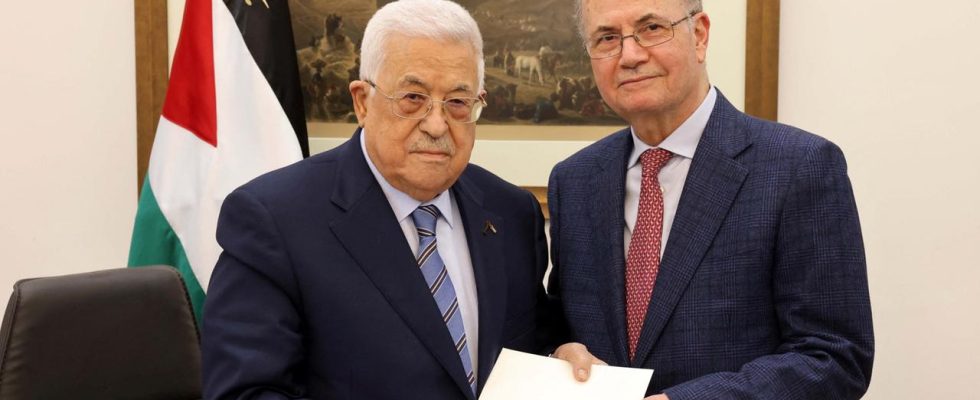The unpopular Palestinian President Abbas has appointed a new government. But without institutional reforms and implementation of the Oslo Agreement, even that will have little impact, critics say.
If you ask Palestinians in the occupied West Bank what is particularly unpopular, Israel comes first for many. In second place, however, is its own government, the so-called Palestinian Authority, or PA for short.
Recent polls show that almost 60 percent of Palestinians want it to be dissolved. Because it is seen as useless, increasingly corrupt and authoritarian.
Now there is also pressure from outside: US President Joe Biden said the PA must be “revived”. And Mahmoud Abbas, the 88-year-old Palestinian president, has reacted: the previous government is resigning and a so-called technocrat government under Prime Minister Mohammad Mustafa is taking over.
“Show that we want progress”
Mustafa is a recognized economic expert, but has also been a close advisor to Abbas. He is not a threat to him, also because he does not belong to any of the Palestinian groups. But that is also a problem. There is criticism, some rejection, from several groups – even from some representatives of the Fatah party, of which Abbas is the leader.
Sabri Saidam, its deputy general secretary, sits on Fatah’s central committee and has served as a minister several times. He clearly has concerns about the new technocrat government, but he still defends it: “The appointment of the new government is intended, on the one hand, to show the Palestinians that we are ready to open up. We also want to show the international community that we are making progress “But on the basis of a Palestinian agenda and not an agenda that comes from outside,” explains Saidam.
“Little the government can do”
Diana Buttu is more open about it. The lawyer, who teaches at Harvard, worked for Abbas for years. She sees the new government as depoliticizing the PA – and that is wrong. Plus, it’s like changing seats quickly on the Titanic.
“The reason is that the PA is not sovereign,” says Buttu. “It doesn’t control the currency, the borders, the airspace, not even the natural resources.” There could be a better government, but it couldn’t do more than the previous governments. “As far as everyday life is concerned, there is very little the new government can do because Israel controls our lives,” says Buttu.
Oslo Accords
The Oslo Accords consist of two parts: On September 13, 1993, the Palestine Liberation Organization (PLO) and Israel signed the first of the “Oslo Accords”, named after the location of the exploratory talks. Both parties agreed on peaceful coexistence and mutual recognition, including Israel’s right to exist. The Palestinians should administer the Gaza Strip and the West Bank themselves in an interim phase while Israel withdraws from the areas.
The agreements were made more concrete with the “Interim Agreement on the West Bank and the Gaza Strip” signed in September 1995. The aim was to gradually prepare a two-state solution, which would ultimately result in a sovereign Palestinian state. The agreement was not implemented despite several attempts to revive it. There have been no serious negotiations between Israel and the Palestinians since 2014.
The importance of the Oslo Accords
Xavier Abu Eid, a Christian and representative of the younger generation, has turned away from the PA, for which he most recently worked. His expectations of the new Palestinian government are also very low. For him, this is due to the lack of leeway and the framework conditions that should actually be in place through the Oslo Accords. These were once intended as a path to a Palestinian state – but that was in the 1990s.
“This government has no chance if the Oslo Accords are not implemented,” says Abu Eid. “Israel is openly violating this. And it will make no difference unless there is a commitment from the international community to stop the weakening of the PA.” What weakens the PA the most is the Israeli occupation.
Rebuilding democratic institutions
Reforms in Palestinian politics are also needed. For example, the last presidential election took place in 2005 and the last parliamentary election in 2006. Since then, important institutions such as parliament have been gradually liquidated, says Ibrahim Dalasha, head of a think tank in Ramallah.
“If you think about the government, the problem is that all the institutions we had have been destroyed and become irrelevant,” Dalasha said. Part of any revival must be the development of these institutions. “We need a transformation from control by one man to control by institutions.”
But the conditions for this are poor: not only because Israel is constantly expanding its occupation in the West Bank. The never-ending war in the Gaza Strip also means that the Palestinian Authority’s reputation is at its lowest point – new government or not.
Jan-Christoph Kitzler, ARD Tel Aviv, tagesschau, March 27, 2024 6:05 a.m

